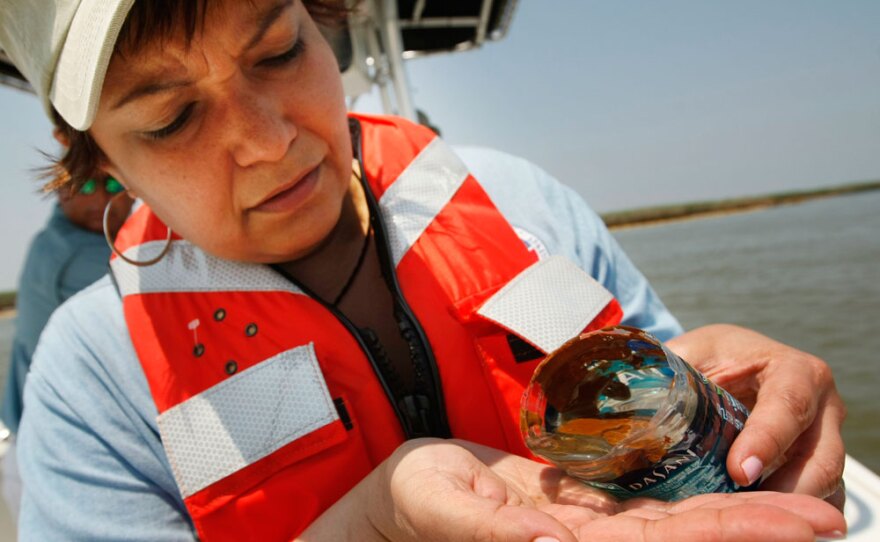Under increasing pressure from the federal government, oil giant BP is agreeing to reduce the amount of a chemical dispersant it is using in the Gulf of Mexico.
BP uses the dispersant Corexit to try to break up the massive amounts of oil gushing out of its blown-out well in the Gulf, but there are questions about the long-term impact of the chemical on marine wildlife and human health.
The Environmental Protection Agency raised concerns about the toxicity of Corexit last week, and told the oil company to use a different chemical agent to try to disperse the giant oil slicks.
"The answer we got back from BP, to me, seemed more like a defense of the current choice," says EPA Administrator Lisa Jackson. "It reminded me a little bit of that old commercial, 'I'd rather fight than switch.' "
BP officials say their own testing finds the dispersant Corexit effective in breaking up oil and safe to aquatic life -- adding that it couldn't find large enough quantities of other dispersants to make the switch.
But Jackson isn't buying it, starting with the company's research.
"We'll do it ourselves. We have a lab, EPA does, in Gulf Breeze, Fla., and we're going to set up a series of toxicity tests, biodegredation tests, to look at what's going on out there now and to look at whether there's a better choice out there," Jackson says.
BP has been using unprecedented amounts of Corexit in the Gulf -- tens or thousands of gallons every day for more than a month now. But not much is known about the dispersant's long-term effects.
Jackson says she met Sunday night with BP officials in southern Louisiana to step up the pressure and get the company to scale back its use of the chemical.
"I think we should see 50 to 75, maybe 80 percent reduction in the amount of dispersant used while we continue to do these tests over the next days," she says.
Jackson says BP will reduce the use of the dispersant on the water surface mostly. She says injecting it underwater into the stream of oil spewing from the blown-out well head has shown to be more effective and less toxic.
BP's Chief Operating Officer Doug Suttles, in a conference call with reporters Monday, appeared to be more willing to reduce the use of Corexit.
"As we stated to them [EPA], if we can find an alternative which is less toxic and as effective and as available -- because many of these are not available in the quantities required -- but if it's available we will switch to that product," Suttles said.
This flare-up with EPA is one of several such instances in recent days.
Parish leaders in southern Louisiana say the company is responding too slowly to getting booms out to protect marshes, wetlands, estuaries and islands.
They say BP, which is paying for and thus coordinating the response, sometimes disagrees with local leaders over which islands and wetlands to protect.
David Carmadelle, mayor of the oil-inundated community of Grand Isle, says BP's decisions when deploying booms are sometimes puzzling.
"They activated 11 fishermen day before yesterday from Grand Isle, sent them all the way here to Venice to get booms when we got booms in Grand Isle. This is the kind of stuff we have to go through," he says.
Everyone, from local fishermen to Gov. Bobby Jindal, appears to be getting more and more frustrated with BP.
"They will be held accountable," said Interior Secretary Ken Salazar, who visited the Gulf Coast on Monday. "We will keep our boot on their neck until the job gets done."
But Salazar's suggestion over the weekend that BP might be pushed out of the way if it can't get the job done, appears now to be little more than hyperbole.
At the White House on Monday, Coast Guard Commandant Thad Allen, who is leading the administration's response, said the government doesn't have much choice but to stick with BP.
"To push BP out of the way would raise a question: to replace them with what?" he said.
Allen defended BP, saying he's satisfied with the coordination and that the company is exhausting every technical means possible to cap the blown-out well and contain the oil.
Copyright 2022 NPR. To see more, visit https://www.npr.org. 9(MDAzMjM2NDYzMDEyMzc1Njk5NjAxNzY3OQ001))







